If you’re as busy as we are (on most days), your inbox can feel less like a communication tool and more like a battleground. The constant flood of messages, urgent demands, and endless newsletters creates chaos that can easily overwhelm the best of us.
Thankfully, a new wave of powerful allies has arrived to help you fight back: AI email assistants. These intelligent tools promise to restore order, save you time, and let you focus on what's truly important.
What is an AI Email Assistant?
So, what exactly is an AI email assistant? Think of it as a smart, proactive secretary that lives right inside your inbox. These are not your average spam filters. Instead, they use advanced artificial intelligence to understand the actual content and context of your messages.
AI assistants use advanced artificial intelligence to understand the actual content and context of your messages.
This allows them to perform a whole range of tasks, from drafting replies (like the Gmelius reply assistant) in your personal writing style to intelligently sorting emails based on priority.
They can pull out key action items from a long thread, automate tedious scheduling tasks, and clear away the clutter so you can see what really needs your attention. The end goal is to give you back your time and your sanity.
Also read: How Do AI Assistants Work? A Complete Technical Breakdown
The Boom in AI Email Assistants is Here to Stay
If it feels like these AI tools are suddenly everywhere, you're right. The demand for them is skyrocketing for a few key reasons. The global market for AI in email was valued at an impressive $1.74 billion in 2024, and it's projected to leap to an incredible $4.52 billion by 2029.
This explosive growth is fueled by the realities of our modern work lives. With the average professional wading through over 120 emails every single day, the old way of managing email is simply unsustainable.
Powerful advancements in natural language processing (a.k.a, NLP – the tech that allows AI to understand human language) have made these assistants smarter and more capable than ever, turning them from a futuristic luxury into an everyday necessity.
Here are the five of the best AI email assistants available today and an analysis of what they bring to the table.
1. Gmelius AI: The Team Collaboration Powerhouse
Gmelius establishes itself as an intelligent AI suite that lives directly inside your Gmail inbox, but its approach is different. Instead of just giving you a prompt box, Gmelius's AI is designed to be a proactive co-pilot for your entire team.
- Features: Gmelius's magic is in its blend of teamwork and intelligence. At its core, it still offers robust shared inboxes (so your team can manage support@ or sales@ without endless forwarding) and visual Kanban boards to turn emails into tasks. But where it truly enters the "assistant" race is with its AI Assistants suite. This includes an AI Reply Assistant that acts as your co-writer; it automatically detects which replies need a reply and then create drafts without any prompting, for you to review and send out. Then there's the AI Sorting Assistant, an intelligent classifier that learns how you categorize messages and applies the correct labels, moving far beyond simple inbox rules.
You can also use the conversational AI assistant "Meli" to perform a wide variety of tasks in your inbox, whether it's summarizing your daily agenda based on emails and meeting invites, or retrieving old information from email threads.
- Pros: The biggest advantage is that this powerful AI is built directly into the collaboration tools. You can use the AI drafter to write a reply, then use Gmelius's shared inbox features and internal notes to discuss that draft with a teammate before sending it — all without leaving Gmail.
Gmelius AI email assistants are powered by the latest version of Gemini, which means you're using cutting-edge AI at no extra cost. Further, there's no gatekeeping of AI features behind enterprise plans or paywalls.
- Cons: With so many features packed in, it can take some time to get fully comfortable with everything Gmelius has to offer. While its mobile app is useful for on-the-go tasks, it doesn't quite have the full power of the desktop version just yet.
- Pricing: Gmelius provides a free plan with basic features (upcoming). Paid plans begin with the Standard tier at $24 per user per month, scaling up to the Pro plan at $36 and the Enterprise plan is custom priced, each unlocking more advanced capabilities. All plans include Gmelius AI assistants.
2. Perplexity: The Intelligent Information Retriever
Perplexity, widely celebrated for its conversational AI search engine, brings its unique brainpower directly to your inbox. Its approach is less about workflow management and more about helping you understand and find information within your mountain of emails.
- Features: The magic of Perplexity lies in its ability to process information. It offers AI-powered email summarization, giving you the key takeaways from a long, complicated thread in seconds. It can help you draft replies with simple prompts, but its true star is its smart search.
You can ask your inbox plain-English questions like, "What was the final budget number Bob sent me last quarter?" and it will find the answer for you.
- Pros: Leveraging a world-class AI, Perplexity offers a truly unique way to interact with your email archive. The ability to "talk" to your inbox is a game-changer for anyone who frequently needs to dig up old information. It turns your email history from a messy closet into a searchable database.
- Cons: As a newer player in the email space, its feature set is more focused on information retrieval and lacks the deep project management and collaborative tools of its competitors. Its functionality is best for those already invested in the Perplexity ecosystem. Plus, the price is prohibitive, to say the least.
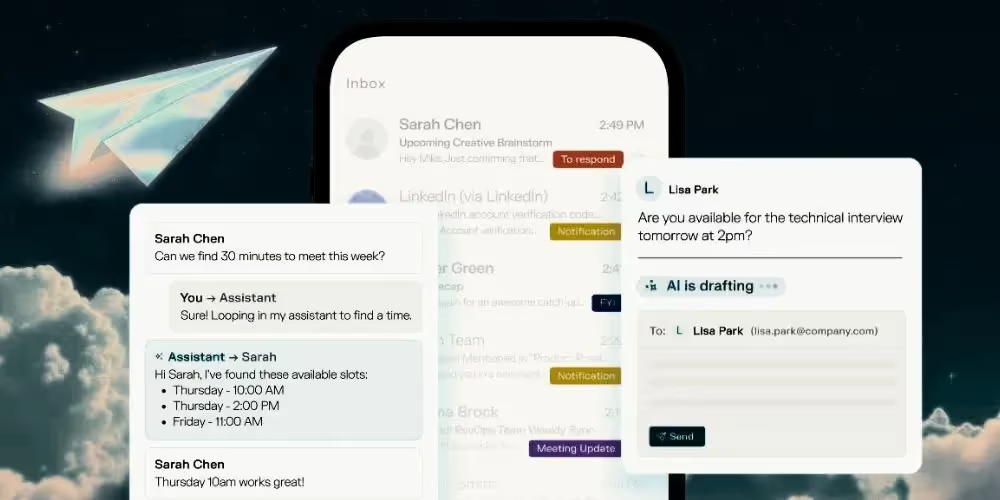
- Pricing: The email assistant features are part of the Perplexity Max subscription, which costs $200 per month or $2000 for a full year. This makes it the most expensive option in our AI email assistant comparison, and almost as costly as building an AI assistant.
3. Superhuman: The Speed Demon
Superhuman is a premium, beautifully designed email client built from the ground up with a single purpose: speed. It’s for the professional who views their inbox as a task list to be conquered as quickly and efficiently as humanly possible.
- Features: The entire Superhuman experience is engineered for velocity. It operates on a command-based interface with comprehensive keyboard shortcuts for nearly every action, eliminating the need for slow mouse clicks. Its AI triage feature learns your habits to automatically sort your most important emails.
Other time-savers include Snippets for reusable blocks of text and a handy "Remind Me" function to resurface emails at a later time.
- Pros: The speed is genuinely impressive. Every interaction is optimized for instant response, which helps users power through their inbox and achieve the elusive "inbox zero." Its clean, minimalist design is a joy to work with and helps you stay focused on the task at hand.
- Cons: That premium experience comes with a premium price tag, making it one of the more expensive options available. This is because its "most advanced AI" is reserved for the Business plan and not available to Starter users. There is also a steep learning curve; to truly unlock its potential, you have to commit to learning its keyboard-shortcut-driven workflow.
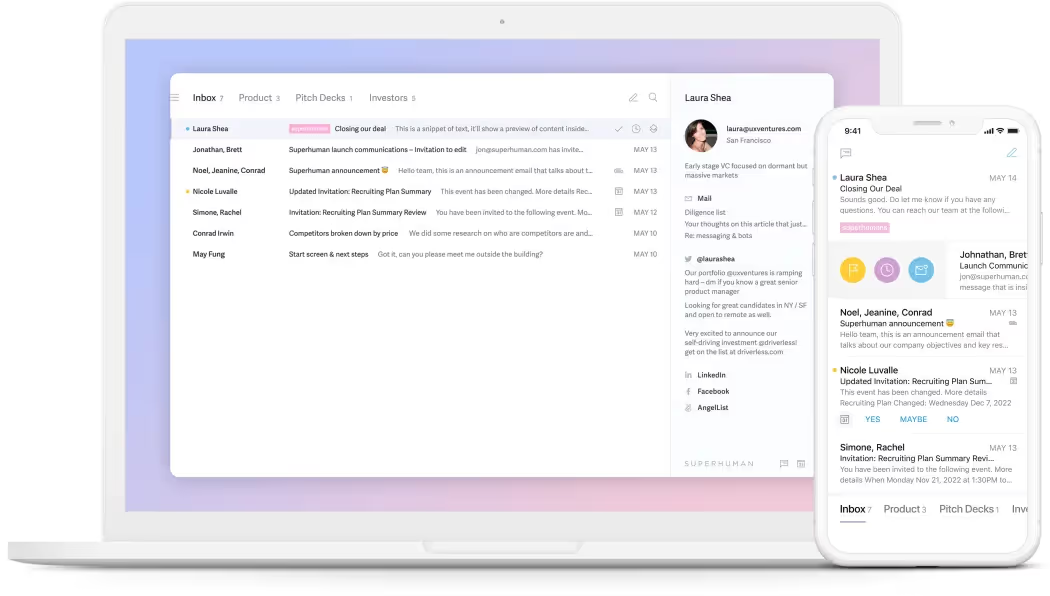
- Pricing: Superhuman starts at $25 per month for the Starter plan and costs $40 per month for Business. It also has a custom-priced Enterprise plan.
4. Fyxer: The True Inbox Automator
Fyxer positions itself as a digital assistant that aims to automate the entire lifecycle of an email. It works by learning your personal habits and style, allowing it to manage your inbox almost entirely on your behalf.
- Features: Fyxer’s intelligence shines through in its AI-powered email triage, which studies your past behavior to prioritize messages just as you would. Its most impressive feature is its ability to draft replies automatically in your unique writing style and tone.
It even includes a meeting assistant that can join conference calls, take notes for you, and generate a summary of action items.
- Pros: The level of personalization is Fyxer’s greatest strength. Because it learns your personal voice, the replies it drafts feel remarkably authentic, saving you an immense amount of time. The meeting automation is a fantastic bonus for anyone who spends a lot of their day in calls.
- Cons: Entry-level plans lack key features like analytics, and you can't add multiple inboxes in the Starter plan. AI email summaries aren't available in Starter either. It also has fewer direct integrations with other business software compared to some of its competitors. And unlike other options on our AI email assistant comparison like Gmelius and Missive, Fyxer doesn’t have a lot of collaboration features.
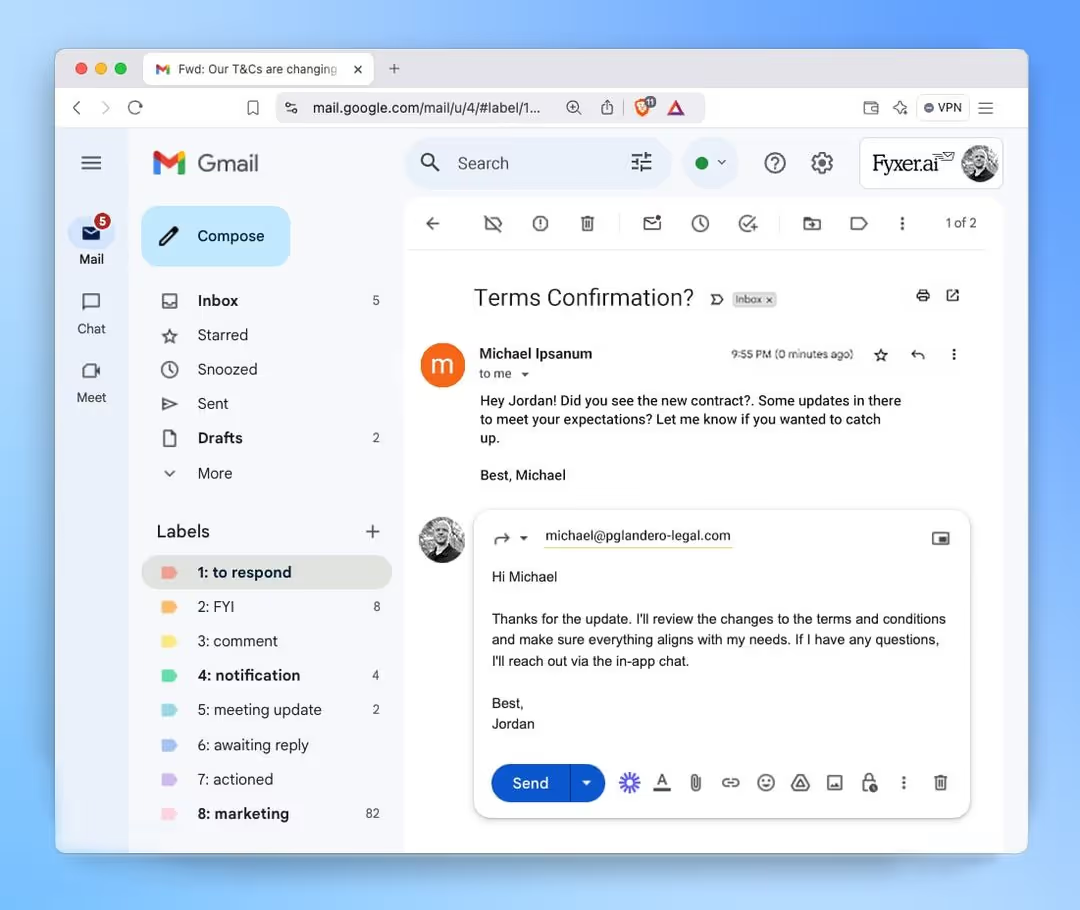
- Pricing: Fyxer offers tiered plans that start at $22.50 per user per month when billed annually.
5. Missive: The Unified Communication Hub
Missive is built on the idea that email is just one part of your team's communication puzzle. It’s a collaborative hub designed to bring all your conversations, both internal and external, into one organized place.
- Features: Missive elegantly combines shared inboxes with real-time team chat. This allows your team to have internal discussions right alongside an email thread before deciding on a reply. It also comes packed with powerful automation rules and task management features.
It centralizes communication by integrating with SMS, WhatsApp, and social media, creating a truly unified inbox.
- Pros: The ability to chat about an email in context is a huge time-saver. The "bring-your-own-key" OpenAI integration is incredibly powerful, giving you direct access to cutting-edge AI and the flexibility to use it for anything from translation to drafting complex replies.
- Cons: With so many features and channels combined, it can feel a little complex at first. Some of the most powerful automation tools and integrations are only available on the more expensive plans.

- Pricing: Missive has a free plan for small teams of up to 3 people. Paid plans start with the Starter tier at $14 per user per month, moving up to Productive at $24 and Business at $36.
Gmelius vs. Perplexity vs. Superhuman vs. Fyxer vs. Missive
Let’s compare these five AI email assistants side by side:
How AI Email Assistants Can Transform How You Work
It's one thing to list features in an AI email assistant comparison, but it's another to see how they can fundamentally change your workday. Let's use Gmelius as an example to paint a picture:
- The Drafting Assistant: You receive a complex client inquiry. Instead of starting from scratch, Gmelius’s AI can generate a complete, context-aware draft. It doesn’t need any prompting – the assistant autonomously analyzes your inbox to reply to important messages, and ignores the ones that don’t require a reply. The time you save on composition is now time you can spend on strategy.
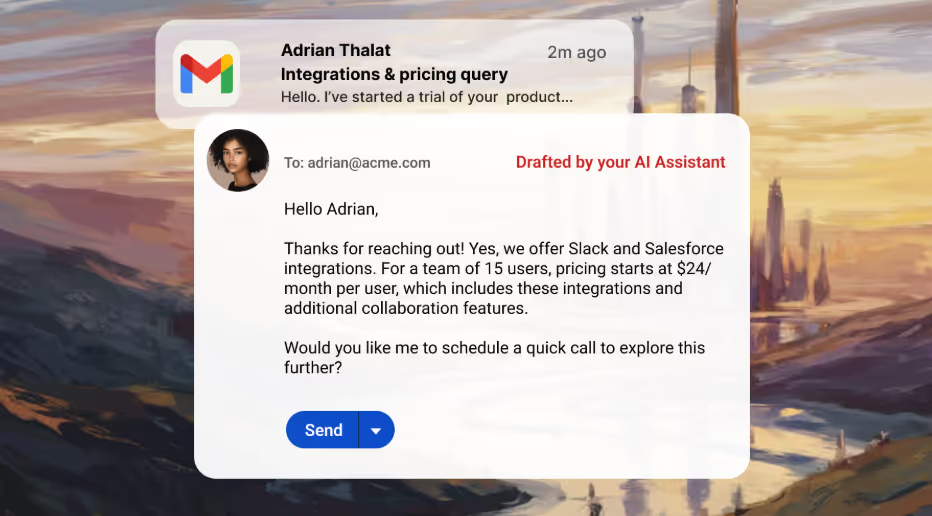
- The Sorting Assistant: As emails pour in, Gmelius’s AI works quietly in the background. It recognizes newsletters and moves them to a "read later" folder. It identifies emails from a VIP client and flags it as important. It applies the correct project label to an incoming message. You can automate inbox management using the assistant (e.g., automatically archive messages from a specific domain). The possibilities are endless.
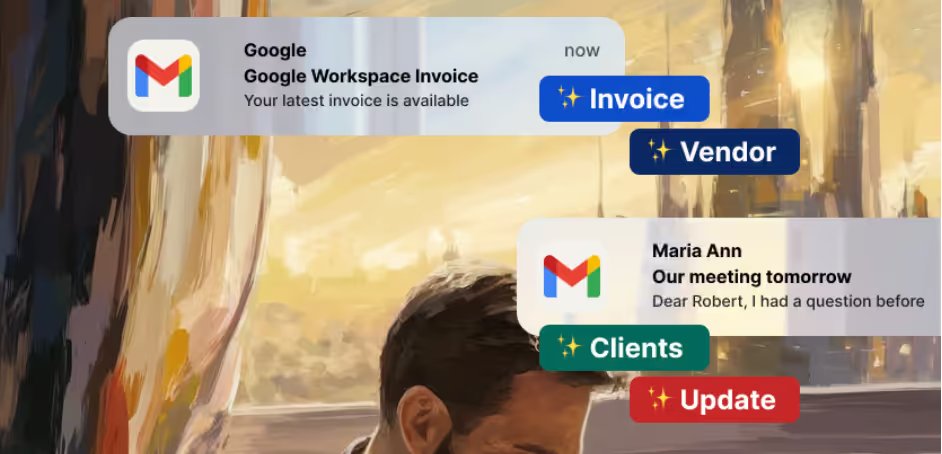
- The Dispatching Assistant: An email arrives at your support@ address. The AI reads the content, sees the keyword "billing," and automatically assigns the conversation to the team member in your finance department. This happens instantly, ensuring the right person is on the job without any manual intervention.
- The Meeting Assistant (upcoming): Someone emails you asking to connect next week. Rather than starting the tedious "what time works for you?" dance, Gmelius can parse the request, check your calendar, and insert a few available time slots directly into your reply. The recipient just has to click a link to book the meeting.
Choosing the Right AI Email Assistant for You
The best AI email assistant for you depends on your specific needs and how you want to navigate the pros and cons of AI assistants. If you're looking for a powerful team collaboration tool that lives inside Gmail, Gmelius is an excellent choice. If you value speed above all else, Superhuman is hard to beat.
For those who want to automate their entire email workflow, Fyxer is a strong contender. If you need a unified communication hub for your team, Missive is a great option. And if you want to leverage the power of a cutting-edge AI for search and summarization, Perplexity is worth exploring. Our ultimate guide to artificial intelligence (AI) for emails will help you make an informed decision.
Ultimately, the right tool will help you conquer your inbox, reclaim your time, and focus on the work that truly drives results.
Try Gmelius AI for free to see if it’s the right fit for you.



.avif)
.avif)
.avif)
.avif)
.avif)
